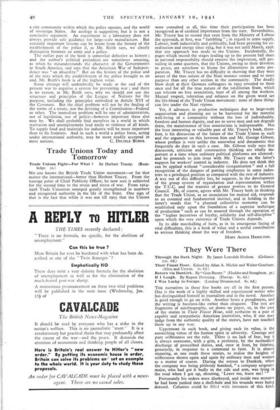Trade Unions Today and Tomorrow
No one knows the British • Trade Union movement—or for that matter the international—better than Herbert Tracey. From the vantage point of Chief Publicity Officer, he now sees it subjected for the second time to the strain and stress of war. From 1914- 1918 Trade Unionism emerged greatly strengthened in numbers and recognised authority in the life of the State. One sign of that is the fact that while it was not till 1915 that the Unions were consulted at all, this time their participation has been recognised as of cardinal importance from the start. Nevertheless, Mr. Tracey has to record that even from the Ministry of Labour the approach, at first, was " fumbling " ; in regard to arms supply, Labour, both industrially and politically, had been pressing for co- ordination and energy since 1934, but it was not until March, 1938, that any approach was made to the Unions. Incidentally, the pages which record the stages leading up to the present full share in national responsibility should remove the impression, still pre- vailing in some quarters, that the Unions, owing to their devotion to peace, are somehow to blame for dilatoriness in arms pre- paration. Mr. Tracey has no difficulty in showing that they were
aware of the true nature of the Nazi menace sooner and to more purpose than any other section in the community. The deadly blow dealt at their German colleagues in 1933 revealed to them once and for all the true nature of the totalitarian State, which can tolerate no free association, least of all among the workers. Mutual respect, toleration and reliance on the given word are the life-blood of the Trade Union movement : none of these things can live under the Nazi regime.
Yet, if advances in productive techniques due to large-scale organisation and planning are to be harvested for the material well-being of a community without the loss of individuality, freedom and human dignity, and are to serve men and not degrade them, the maintenance of free associations is indispensable. Not the least interesting or valuable part of Mr. Tracey's book, there- fore, is his discussion of the future of the Trade Union as such and the argument on this between him and Mr. George Gibson, whose preface is very unlike the somewhat arid documents that frequently do duty in such a case. Mr. Gibson truly says that discussion, criticism and constructive thinking are vitally im- portant at a time when ordinary political platforms are silenced: and he proceeds to join issue with Mr. Tracey on the latter's support for workers' control in industry. He does not think this can be applied without " considerable reorganisation " and a full recognition of the dangers of putting employees in some indus- tries in a privileged position as compared with the rest of industry. A way out of this difficulty lies, he suggests, in the development of the group system of organisation and representation within the T.U.C. and the transfer of greater powers to its General Council. He, of course, agrees with Mr. Tracey both in thinking that the Trade Union, as an association for mutual aid, responds to an essential and fundamental instinct, and in holding in the latter's words that " a planned collectivist economy can be established only upon the foundation of a superior technique of production " such as can be assured through the operation of the " higher incentives of loyalty, solidarity and self-discipline " upon which the very existence of Trade Unions depends.
In its able marshalling of facts, as in its courageous facing of vital difficulties, this is a book of value and a useful contribution to serious thinking about the way of freedom.
MARY AGNES HAMILTON.


























 Previous page
Previous page